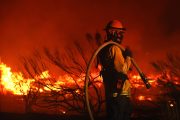In 2006, Kareena Lynde was working in Shasta Lake, California, on a hotshot crew — a group of highly trained wildland firefighters — when she started to notice a sharp pain in her abdomen. At first she chalked up the discomfort, plus symptoms like bloating and nausea, to the nature of her work, with its long, arduous hours and unhealthy backcountry meals.
After one of her shifts, she headed to the nearest town of Reddington to visit an urgent care. She was referred to an OB-GYN, and an ultrasound detected a large tumor on one of her ovaries. At the age of 22, she was diagnosed with an aggressive form of ovarian cancer.
Lynde had insurance but it had a sky-high deductible — she would have to pay $10,000 out of pocket before insurance would pick up expenses, with added costs for things like hospital stays and specialty testing. She raised $45,000 through a GoFundMe to cover costs. After three years of treatment that included surgery, chemotherapy and radiation, she went into remission. About a year later, she received yet another diagnosis: cervical cancer. She was able to beat that, too. She’s been cancer free since 2009.
Firefighters like Lynde are at a heightened risk for some reproductive cancers, including breast, ovarian and uterine cancers, due to exposure to hazardous chemicals and erratic, stressful shift work. Now, thanks to a policy announced Monday, the Federal Employees Compensation Program is including these cancers as part of its presumptive cancer coverage. Now, any federal firefighter, like those working for agencies like the U.S. Forest Service, who is diagnosed with these cancers and has worked for at least five years in the field will qualify for compensation to cover treatment. This change came nearly three years after cancers typically impacting men got coverage. The Office of Worker Compensation Programs (OWCP) has also set up a special claims unit to process requests specific to firefighters.
-
Read Next:
“This policy change acknowledges the unique occupational hazards faced by women firefighters and ensures they receive the care and support they deserve,” Christopher Godfrey, director of the OWCP, said in a statement. “This advancement represents a transformative shift toward equity and recognition of women’s contributions and the protections they deserve given the risks they take and the exposures they face.”
A 2022 policy left cancers that disproportionately impact women out of the compensation program while granting coverage for testicular and prostate cancer. Ever since, advocates have been working with Godfrey’s office to ensure that women firefighters received similar protections. Prior to the policy in 2022, firefighters had to provide evidence that their cancer was caused by their occupation, a task that was hard to do and was judged on an individual basis. Now if their cancer is on the presumptive cancer list, they won’t need that burden of proof.
For Lynde, who has been in the field for 22 years, it was not only a win for women firefighters and their health, but also, “the acknowledgement that we are a part of the workforce as well,” she said. “Our cancers that affect us should be acknowledged, just like any cancers that only affect men.”
To enact this policy change there needed to be enough research backing up the connection between these cancers and firefighting. But because there are so few women in firefighting, the impacts of the work on their bodies has been difficult to study. About 12 percent of wildland firefighters and 5 percent of all career firefighters are women, according to the U.S. Fire Administration.
“I think why there’s been a delay in recognizing some of these reproductive cancers in women is that there is an extremely low rate of women in the fire service, so they’ve been very underrepresented in terms of research,” said Sara Jahnke, senior scientist and director at the Center for Fire, Rescue and EMS Health Research.
In recent years that has begun to change, with an “explosion of research on health and women firefighters,” Jahnke said. The Federal Emergency Management Agency and the National Institute for Health have both funded research on women firefighters in recent years. “I think that’s probably underlying why some of these advances are being made,” she said.
So far studies point to a lot of different factors that could increase risk of cancer for firefighters regardless of gender, including the chemicals they are exposed to in smoke, their sleep cycles and the impact of shift work.
In more recent years, data has made links between firefighting and these reproductive cancers on the list like breast cancer and cervical cancer, Jahnke said.
The OWCP worked with the National Institute for Occupational Safety and Health and with Dr. Steven Moffatt, an expert in firefighter health, to evaluate all the most recent evidence.
Pete Dutchick, a volunteer with Grassroots Wildland Firefighters, an advocacy organization that helped spearhead this work, said he was elated by the news.
Sixteen different organizations advocated for the change, including groups like Women in Fire, an organization dedicated to increasing the number of women in the field. “The fact that all these entities worked together to come through in a relatively short period of time to make these historic changes, I think that is, more than anything, inspiring. And really it gives me hope for the future,” he said.
-
Read Next:
It also has the potential to create ripple effects. “A lot of these federal changes have an impact on firefighters not just at a federal level, but a state and local level,” Dutchick said.
Without this coverage, many firefighters have had to turn to crowdsourcing funds and nonprofits to pay for steep treatment costs.
Now, “you’re not going to be stuck with a potentially six-figure medical bill for you or your family to take care of,” Dutchick said. “It’s the hope, it’s peace of mind, but it’s also just ensuring you have coverage … and are protected to some degree financially.”
That peace of mind can go a long way to boosting employee morale in a field that is struggling with low pay and worker shortages.
“We’re at a time where we’ve got mega fires … and it’s not just an issue that lives in the backcountry anymore. I mean, it’s coming to our doorsteps,” he said. “In order to take on that challenge, we just need a really robust and talented workforce. I think in order to keep that talent we need to make sure we’re taking care of people.”
Shortly after The 19th interviewed Dutchick, fires broke out in Los Angeles and rapidly spread due to high winds, leading to the evacuation of over 100,000 people as of press time.
If another larger fire breaks out in the coming days, Lynde will be dispatched.








